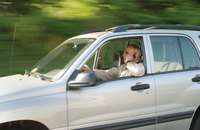The New Killer on the Road: Distracted Drivers
WASHINGTON, March 6 /PRNewswire-USNewswire/ -- Drunk driving deaths have plummeted over the past 20 years, yet total traffic fatalities have increased as a result of distracted and aggressive driving. That's why the American Beverage Institute (ABI) has launched a nationwide public awareness campaign about the dangers of distracted and negligent driving.
The ABI has been at the forefront in stopping drivers with high blood- alcohol concentrations from getting behind the wheel. But traffic safety needs a bigger fix than keeping abusive drinkers off the road.
The full-page advertisement in this week's edition of U.S. News and World Report shows a young woman talking on her cell phone, sending a text message, checking her email, eating, and speeding. The headline reads: "She would never drive drunk yet she's MORE dangerous than a drunk driver."
When done behind the wheel, many everyday activities can be lethal. In fact:
-- Distracted driving is the number one killer of American teens.
Alcohol-related accidents among teens have dropped, but because
distracted driving is on the rise, teenage traffic fatalities remain
unchanged.
-- While over 90% of teen drivers say they don't drive drunk, nine out
of 10 say they've seen drivers distracted by passengers or using cell
phones.
-- A drowsy driver, or even one going ten miles faster than others on the
road, is more dangerous than one who is legally intoxicated.
-- More than 80% of drivers admit to hazardous behavior while behind the
wheel including: reading, changing clothes, steering with feet,
painting nails, and shaving.
-- Drivers on cell phones are more impaired than drivers with a .08 BAC
level.
"Now that we've had such success in the war against drunk driving, we need to turn our attention to the dangers of distracted driving," said Sarah Longwell, spokeswoman for the ABI. "Most people would never drive drunk, yet people don't think twice before taking a call while driving, sending a text message, or eating, even though those actions are often as bad, if not worse than driving drunk."
The ABI has also run negligent driving PSAs on television stations and billboards across the country. To view the PSAs, go to http://www.negligentdriving.com/.



